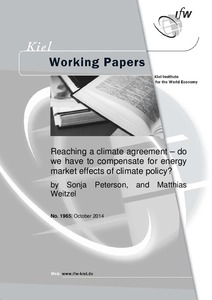Reaching a climate agreement - do we have to compensate for energy market effects of climate policy?
"Because of large economic and environmental asymmetries among world regions and the incentive to free ride, an international climate Regime with broad participation is hard to reach. Most of the so far proposed Regimes base on an allocation of emission rights that is to be perceived as fair. Y...
| Main Authors: | , |
|---|---|
| Institution: | ETUI-European Trade Union Institute |
| Format: | TEXT |
| Language: | English |
| Published: |
Kiel
2014
IFW Kiel |
| Subjects: | |
| Online Access: | https://www.labourline.org/KENTIKA-19115896124919330789-Reaching-a-climate-agreement--.htm |
| _version_ | 1771659893551398914 |
|---|---|
| author | Peterson, Sonja Weitzel, Matthias |
| author_facet | Peterson, Sonja Weitzel, Matthias |
| collection | Library items |
| description | "Because of large economic and environmental asymmetries among world regions and the incentive to free ride, an international climate Regime with broad participation is hard to reach. Most of the so far proposed Regimes base on an allocation of emission rights that is to be perceived as fair. Yet, there are also some arguments to focus more on the actual welfare implications of different Regimes and to aim for a "fair" Distribution of resulting costs. Using the Computable General Equilibrium model DART, we analyze the driving Forces of welfare implications in different Scenarios where a global Emission target derived from the 2 degree target is reached. These include two Regimes that are often presumed to be "fair", namely a harmonized international carbon tax and a cap and trade System based on the convergence of per capita Emission rights, and additionally an "equal loss" Scenario where welfare losses relative to a Business as usual Scenario are equal for all Major world regions. We show that "equal losses" would mean in particular to compensate for the effects of climate policy on energy markets and e.g. to compensate for the loss of oil revenues as the Organization of Petroleum Exporting Countries (OPEC) argues for." |
| format | TEXT |
| id | 19115896124919330789_f392c6abc157445db19b484f7368dd13 |
| institution | ETUI-European Trade Union Institute |
| is_hierarchy_id | 19115896124919330789_f392c6abc157445db19b484f7368dd13 |
| is_hierarchy_title | Reaching a climate agreement - do we have to compensate for energy market effects of climate policy? |
| language | English |
| physical | 1 v. Digital |
| publishDate | 2014 |
| publisher | Kiel IFW Kiel |
| spellingShingle | Peterson, Sonja Weitzel, Matthias environmental policy gas emission international taxation welfare state Reaching a climate agreement - do we have to compensate for energy market effects of climate policy? |
| thumbnail | https://www.labourline.org/Image_prev.jpg?Archive=108747992692 |
| title | Reaching a climate agreement - do we have to compensate for energy market effects of climate policy? |
| topic | environmental policy gas emission international taxation welfare state |
| url | https://www.labourline.org/KENTIKA-19115896124919330789-Reaching-a-climate-agreement--.htm |

